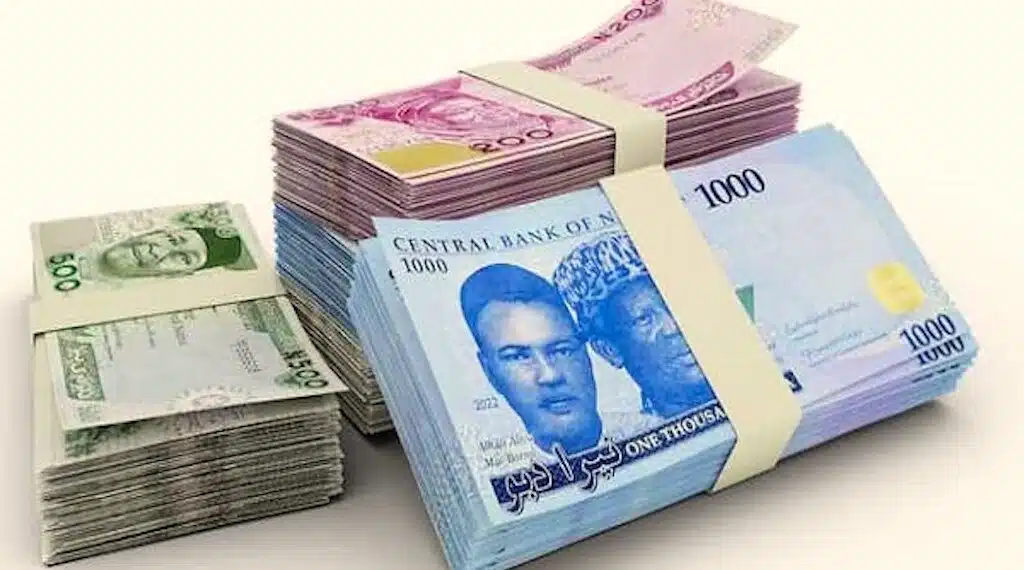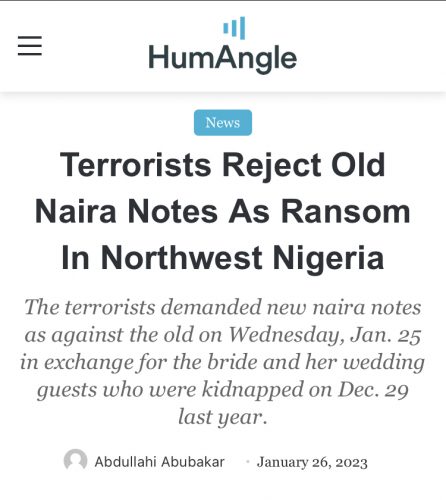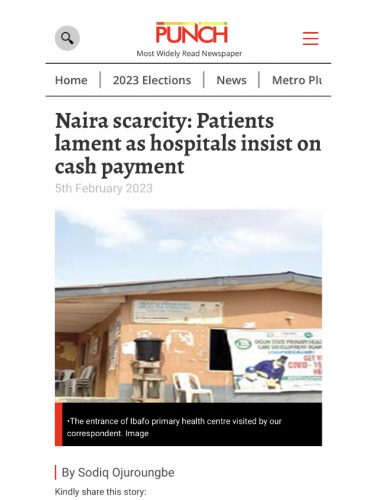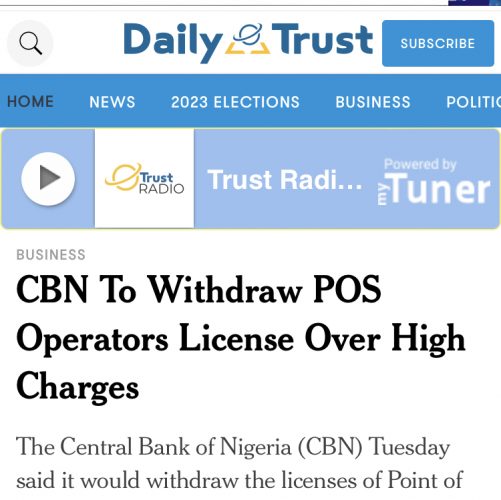Nigerians were going through their regular activities on October 26, 2022, when the Central Bank Of Nigeria (CBN) made an announcement that would later affect many lives and shape the 2023 general election.

The CBN on October 26, 2022, announced the introduction of the redesign of ₦200, ₦500, and ₦1,000 banknotes.
Godwin Emefiele is at the helm of affairs at the apex bank, controlling the whole scenario.
At the time, he said the banknotes were redesigned due to a request from the Federal Government.
According to him, the new notes would begin circulation from December 15, 2022.
Also, the old banknotes would remain legal tender and circulate together until 31 January 2023.
On January 31, the old notes were to cease to be legal tender and would not be accepted as a means of payment.
Before the 2022 redesign, the last time the Naira was redesigned was in 2014.
In 2014, the CBN changed the design of the 100 Naira note to commemorate Nigeria’s centenary but both notes are still in circulation.
According to the CBN, the redesigned Naira notes and new limits on large cash withdrawals would help curb money laundering.
The apex bank also said it would make digital payments the norm in Africa’s biggest economy and curb ransom payments.
Vote Buying
A former Speaker of the House of Representatives, Yakubu Dogara, commended President Muhammadu Buhari for the redesign.
An ecstatic Dogara had said it would stop vote buying in the 2023 elections.
“I want to encourage us that whatever we are passing through in terms of Naira redesign is not comparable to allowing some people to buy votes.
“I want to appeal to us that this is part of the sacrifice that will give us a transparent election,” Dogara said.
However, the Presidential candidate of the All Progressives Congress (APC), Bola Ahmed Tinubu, commented on the redesign during a campaign stop.
In Abeokuta Ogun State on January 25, Mr Tinubu alleged that the Naira design policy was orchestrated to ensure his defeat in the election.
At the time, Nigeria had also been experiencing fuel scarcity that started late into 2022.
Mr Tinubu had said that both the Naira redesign and Fuel scarcity were done against him.
But, he noted it would not stop his supporters from voting for him and making him win the election.
Two months and few days after, Mr Tinubu was declared the winner of the 2023 presidential election on March 1.
Other Alternatives
As the elections have come and passed, it is not clear if the CBN was able to curb vote buying with the policy.
Political parties and their members found various means to attempt vote buying including the use of foreign currencies.
A lawmaker in the House of Representatives, Dr. Chinyere Igwe, was arrested with $500,000 in Rivers State.
With him was also a list of how the money was to be used for vote buying including paying electoral officers.
Similarly, security operatives arrested the Majority Leader of the House of Representatives Alhassan Ado-Doguwa.
He reportedly burnt 13 people alive and shoot three others to death in Tudunwada Local Government Area of Kano State.
Mr Doguwa had noted earlier that the Naira redesign which led to scarcity will affect the electioneering expenses of politicians.
He said this while noting that he needed ₦70 million in “hard copy” for the poll.
Also, FIJ reports that the APC transferred money to voters in exchange for their data.

This was done with the use of a website reportedly created for that purpose.
Ransom Payment
The CBN said the Naira redesign policy would reduce ransom payments in Nigeria.
A terror group responsible for the kidnap of a bride rejected the ransom payment of ₦3 million made in old notes.

This took place in Masama-Mudi village of Zamfara State.
Mr Emefiele thinks kidnapping and ransom-taking have somehow reduced.
“I think it (Naira redesign) has slowed those people down because they know that if they collect old notes, nobody is going to collect it from them,” he said.
Other Areas Affected
The naira redesign policy also affected the health sector, as hospitals reportedly demanded cash payment before treatment.
According to Punch, the hospitals rejected cash transfers due to network issues.

Similarly, the Poultry Association of Nigeria (PAN) stated that the redesign policy has been creating untold hardship for poultry farmers.
The Association said it lost over ₦30 billion due to the redesign policy, as people could not access cash to buy their produce.
Footage online also showed several people who had to go through extreme means to get cash.
Nigeria Woman Goes Naked To Protest New Naira Scarcity In The Bank Hall#Emefiele #NairaScarcity #CentralBanks @NGRPresident @MBuhari @ProfOsinbajo pic.twitter.com/YGw3btnX1t
— EagleSightMedia (@Eaglessightnews) February 1, 2023
– Naira notes scarcity : Elderly man breaks down in tears at a bank over his inability to withdraw money.
— Postsubman (@Postsubman) February 14, 2023
Protests
When the old Naira was declared as Illegal tender by the CBN, the new notes had not been properly circulated.
This forced Nigerians in several states to resort to protests to express their displeasure.
Nigerians in Kwara, Ogun, Oyo, Delta, Edo, and other states began protesting.
Benin City, the capital of Edo State, Nigeria, has been shut down due to protests over the scarcity of the new naira. Angry protestors are destroying ATMs and bank buildings. Take a look:pic.twitter.com/5V25GFCuAq
— Steve Hanke (@steve_hanke) February 15, 2023
The protests led to the destruction of banks, and government properties, and the death of some protesters.
Protesters attempted to invade the Central Bank of Nigeria at Ring road in Benin, Edo State on Wednesday. The demonstrators were at the offices of the CBN in Benin to protest the untoward hardship occasioned by the scarcity of the naira notes pic.twitter.com/sWfSawmoJq
— Ayomide Jai (@AyomideJai) February 16, 2023
POS Operators
For Nigerians who could not endure the long queues at banks to withdraw money, they had to resort to Pont of Sale (PoS) operators.
With an increase in demand for cash, PoS operators began charging ridiculously high fees.
They were charging between ₦1000, ₦1,500, and ₦2000 for every ₦5000 and ₦10,000 withdrawn by customers and ₦300 for ₦1000.
However, the CBN had explained that the approved charge rate for every ₦5,000 is ₦100.

The CBN promised to punish operators extorting Nigerians.
New Deadline
Several bodies, persons, and even lawmakers had unsuccessfully tried to get the CBN to extend the old Naira notes deadline.
However, on March 3, the Supreme Court ruled that the old notes would remain legal tender till December 31.
Still, Nigerians were not so willing to collect the old notes.
They had concerns about whether the CBN would still collect the old notes on the order of the Supreme Court.
On March 13, the CBN directed commercial banks to dispense and receive the old banknotes.
The apex bank said the notes remain legal tender until 31 December, as directed by the Supreme Court.
Gradually, the queues at banks are reducing, both old and new notes are circulating and everything is returning to normal.
However, the experiences the Naira redesign brought would not be forgotten soon.

